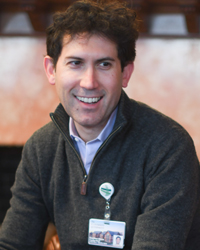Professionalism, Communication and Reflection
 Since 2002, Larner’s Professionalism, Communication, and Reflection (PCR) course has served as an opportunity for preclinical medical students to reflect on their medical school experiences. The groups offer a non-judgmental environment with
a small group of peers. By taking time for these reflections, says PCR Course Director and Associate Professor of Family Medicine Stephen Berns, M.D. (at right), “students learn how to develop skills in active listening, vulnerability,
and how to seek support.”
Since 2002, Larner’s Professionalism, Communication, and Reflection (PCR) course has served as an opportunity for preclinical medical students to reflect on their medical school experiences. The groups offer a non-judgmental environment with
a small group of peers. By taking time for these reflections, says PCR Course Director and Associate Professor of Family Medicine Stephen Berns, M.D. (at right), “students learn how to develop skills in active listening, vulnerability,
and how to seek support.”
Over the years, PCR has evolved with invaluable guidance from former course directors such as Yvette Pigeon, Ed.D., Dana Walrath, Ph.D., Lee Rosen, Ph.D., and Shaden Eldakar-Hein, M.D. It was Eldakar-Hein
who worked with Goyal, Epstein, Dawson, Brach, and Finnie to initially link social determinants of health topics more clearly with PCR sessions. Now, this work is in the midst of its next evolutionary leap with Berns at the helm.
In January
2020, Berns became PCR course director, and in the middle of a pandemic that brought the broken pieces of the American health care system into full view, he seized on the theme of structural change and began to reconfigure PCR once again.
PCR is now delivered in five modules. “Becoming a Physician,” “Humanity,” and “Society and Medicine” are taught during the first year; “Advocacy and Social Justice” is addressed during the second year;
and during their third year, students engage in the final module—“The Medical Culture and Resilience.” In the first three modules, students explore topics like self-identity, the burden of individual trauma, and the concept of implicit
bias.
As they enter the second year, Berns and course professors focus primarily on advocacy, asking the students to consider questions such as “What is a physician’s role as an advocate— for their patients, their colleagues,
and their communities?” and “Why should or shouldn’t social justice be taught in medical school?”
During their third year, the final PCR module challenges students to find their meaning in medicine. They learn how
to approach situations of moral distress and investigate the “hidden curriculum,” which encompasses the “implicit messages about values, norms and attitudes” that students learn outside of the classroom, says Berns.
As he continues to evolve PCR, Berns says he’s committed to increased training for faculty.
“A lot of medical school faculty around the country have recognized their own shortcomings in the areas of social justice and health
equity. We’re hearing them say, ‘This isn’t an area I got trained on when I was in medical school,’ and ‘I want to learn more,’” he says. “I appreciate that Larner faculty are open, eager, and curious
to learn.”